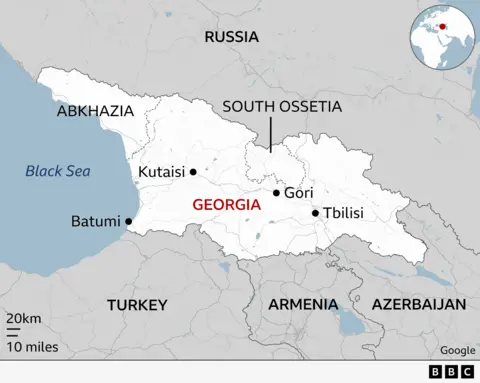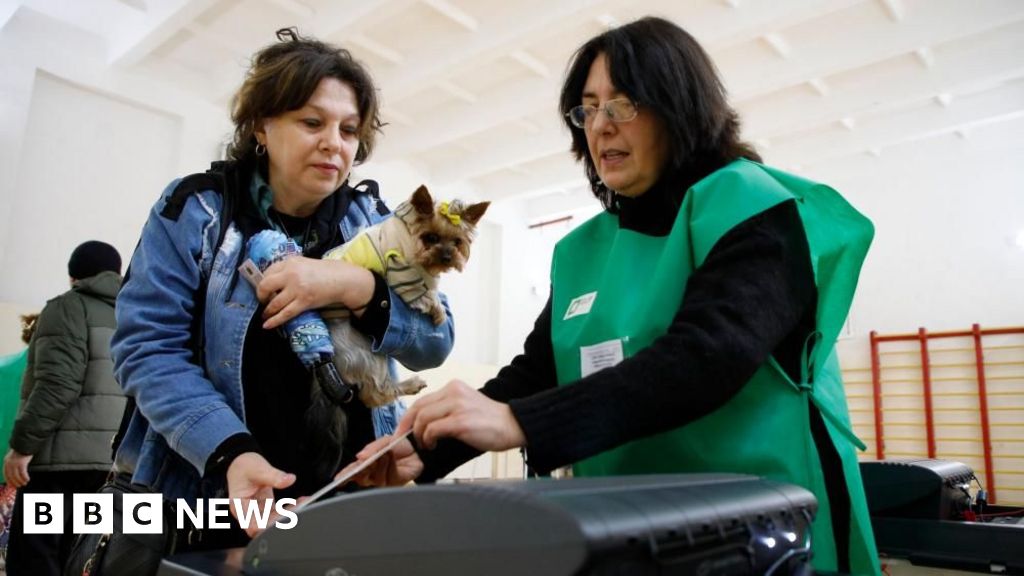 EPA-EFE/REX/Shutterstock
EPA-EFE/REX/ShutterstockGeorgia’s increasingly authoritarian ruling party is set to come first in a pivotal election focused on the country’s future path in Europe, competing exit polls say.
However, the two exit polls disagree on who will be able to form a majority. Both the governing Georgian Dream party of billionaire businessman Bidzina Ivanishvili and the opposition groups trying to end its 12 years in power have claimed victory.
Projected results will give a clearer indication in the coming hours.
Georgians turned out in big numbers on Saturday in this South Caucasus state bordering Russia, and there were numerous reports of vote violations and violence outside polling stations.
Two people ended up in hospital and the biggest opposition party’s HQ came under attack from supporters of the ruling party.
One opposition official in a town south of Tbilisi told the BBC that he was beaten up first by a local Georgian Dream councillor, and then “another 10 men came and I didn’t know what was happening to me”.
The opposition has described this high-stakes vote as a choice between Europe or Russia. If the opposition TV exit poll is backed up by results they have a chance of defeating Georgian Dream after three terms in office.
“This is the moment. In future there may be no such moment,” opposition voter Levan Benidze, 36, told the BBC. “I know there are a lot of geopolitical risks – from Russia – but this could be the pivotal moment, a turning point.”
 Matthew Goddard/BBC
Matthew Goddard/BBCAlthough Georgia was made a candidate to join the European Union last December, that move has now been frozen by the EU because of “democratic backsliding – in particular a Russian-style “foreign influence” law targeting groups receiving Western funding.
The USSR may have ceased to exist more than three decades ago, but Moscow still considers much of the old Soviet empire its own backyard and Russia’s sphere of influence.
It will have appreciated Georgian Dream’s campaign promise of a “pragmatic” Russia policy, not to mention Brussels’ decision earlier this year to halt Georgia’s EU accession process.
Ivanishvili’s rhetoric has become increasingly anti-Western, indicating that under Georgian Dream might pull the country back into Russia’s orbit.
Georgians had a simple choice, the party’s founder said after voting in Tbilisi: either a government that served them, or an opposition of “foreign agents, who will carry out only the orders of a foreign country”.
He has repeatedly spoken of a “global war party” pushing the opposition towards joining the war in Ukraine, while Georgian Dream (GD) is the party of peace. For many voters the message has worked.
“The most important thing – for me, my family, my grandchildren – is peace that I wish for all Georgians,” GD voter Tinatin Gvelesiani, 55, told the BBC at a polling station in Kojori, south-west of the capital. “Only Georgian Dream” would bring peace, she added.

Election observers reported a string of violations across the country, from ballot stuffing inside polling stations to intimidation of voters outside.
With less than an hour to go before the polls closed, pro-Western President Salome Zourabichvili appealed to opposition voters not to be intimidated.
“Don’t get scared. All this is just psychological pressure on you,” she said in a live address on social media.
The intimidation turned into violence for Azat Karimov, 35, the local chair of the biggest opposition party United National Movement in Marneuli south of Tbilisi.
He told the BBC how he was set upon when his team tried to investigate votes being falsified by Georgian Dream officials. He also alleged that voters were being bribed to back the governing party.
“[A Georgian Dream councillor]came with 10-20 people… before police could come I told him to calm down. Right away the councillor started beating me.”
On the eve of the vote, a Georgian monitoring group highlighted a Russian disinformation campaign aimed at the election.
The Kremlin has denied meddling in Georgia’s domestic affairs and has accused the West of “unprecedented attempts” at interference.
Earlier this year Sergei Naryshkin, director of Russia’s Foreign Intelligence Service, the SVR, accused the United States of planning a “Colour Revolution” in Georgia.

